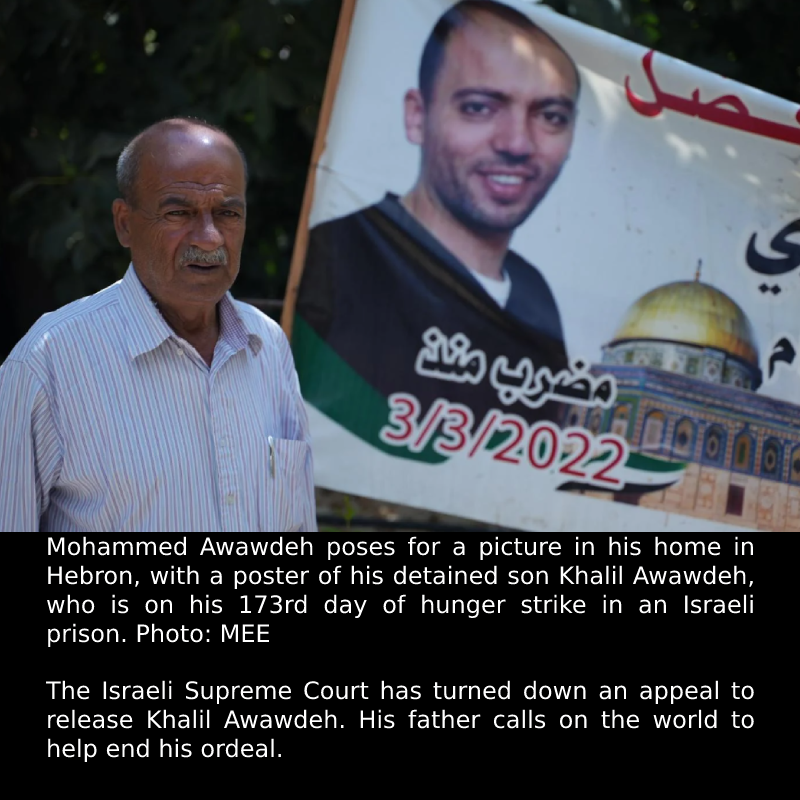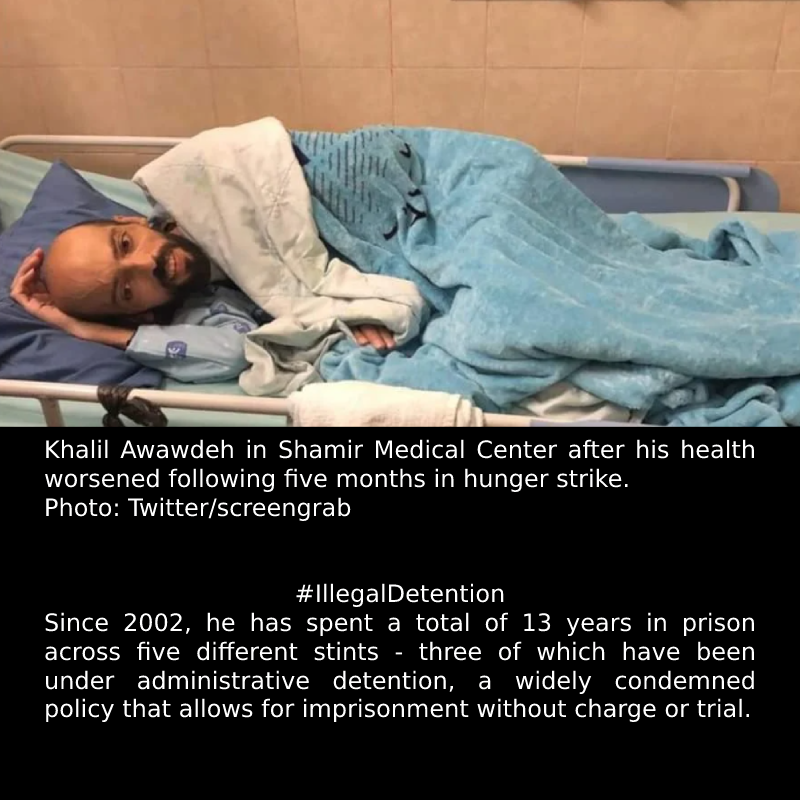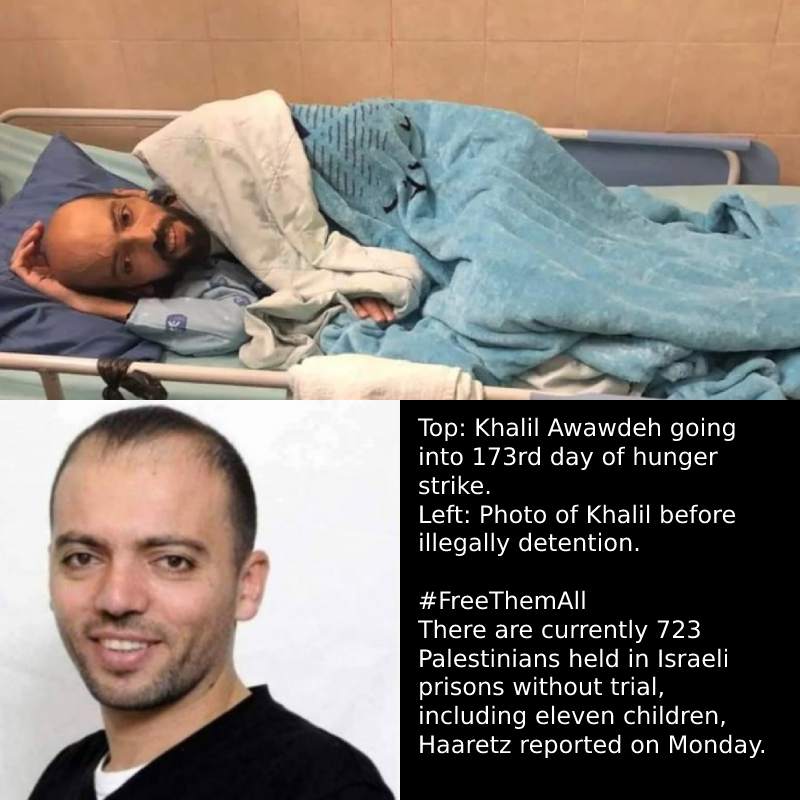By Akram al-Waara in Hebron, Occupied West Bank.

The Israeli Supreme Court has turned down an appeal to release Khalil Awawdeh. His father calls on the world to help end his ordeal.
It’s been 173 days since Khalil Awawdeh began his hunger strike in protest against his detention in an Israeli prison.
With every passing day, as his health deteriorates, the family of the 41-year-old Palestinian say they can’t help but wait for the worst news possible.
“For the past few weeks we spend every day waiting for a phone call to tell us that Khalil has become a martyr,” Mohammed Awawdeh, Khalil’s father, told Middle East Eye from the family’s home in Idna in the southern occupied West Bank district of Hebron.
“We can’t sleep, we can’t eat, we can’t do anything. We spend every day just worrying about Khalil, and if we will see him again, alive,” Mohammed said.
Khalil was transferred to the Shamir Medical Center (Assaf Harofeh) in central Israel last week after his health severely deteriorated, following more than five months on hunger strike, during which he has refused all food, vitamins, and nutritional supplements.
“The medical report said that his heart could stop at any moment, and that his major organs like his kidneys and liver aren’t functioning properly because of the lack of nutrition,” Mohammed said.
He added that the only person who has been allowed to see Khalil since he was transferred to the hospital is his wife, Dalal, who visited him on Saturday.
“She said he was just skin and bones. She could barely recognise him,” he said.
“What is happening to Khalil, and to all the Palestinian prisoners in administrative detention is an injustice,” Mohammed said. “It needs to end.”

A life spent in prison
Khalil Awawdeh has spent much of his adult life in and out of Israeli prison. Since 2002, he has spent a total of 13 years in prison across five different stints – three of which have been under administrative detention, a widely condemned policy that allows for imprisonment without charge or trial.
He was first arrested in January 2002, and was sentenced to five and a half years in prison. He was released in May 2007, but just five months late, he was re-arrested and sentenced to another two years in prison on various charges related to his political activity.
In 2011, Khalil married Dalal, and they would soon go on to have four daughters, the youngest of which is just one and a half years old.
Between 2012 and 2021, Khalil was arrested three more times by the Israeli army, and was imprisoned each time under administrative detention. The policy allows for three- to six-month periods of detention, which are renewable indefinitely.
“The first time he was put in administrative detention, he was imprisoned for 27 months, the second time was 33 months, and now this most recent time it has been eight months,” Mohammed said.
After he was arrested on 27 December, he was given a six-month administrative detention order. Three months into his detention, on 3 March, Khalil declared that he was going on hunger strike in protest at his detention.
His family told MEE that on the 111th day of his strike, Israeli prison authorities allegedly told Khalil that they would not renew his administrative detention order, which only had six days left on it, if he agreed to end his strike.
So, under the impression that he would be released in less than a week, Khalil ended his strike, and agreed to receive medical treatment which included IV vitamins and nutritional supplements.
A few days later, however, his administrative detention was renewed for another four months, and so he re-launched his hunger strike.
‘Inhumane policy’
When Khalil was arrested in December, Israeli forces came to his family’s home in the middle of the night, confiscated his phone, and carted him off in handcuffs.
According to his father, the Israeli military prosecutor attempted to have him imprisoned on charges of “inflammatory” posts on Facebook- a charge that Khalil and his lawyers denied.
“The military judge ruled that they didn’t have enough evidence to keep him on those charges, and ordered Khalil’s release. But before he could come home, the Israeli intelligence requested he be put under administrative detention, and the court allowed it,” Mohammed told MEE.
A representative from the Palestinian Prisoners Society told MEE that what happened to Awawdeh is extremely common under Israel’s military court system, which has a 99 percent conviction rate against Palestinians.
“Administrative detention allows Israel to hold Palestinians for months, and often years, under what Israeli intelligence officials claim to be secret evidence, which is kept both from the prisoners and their legal team,” PPS spokesperson Abdullah al-Zghari told MEE.
According to al-Zghari, over the past 10 years, 8,000 Palestinians have been imprisoned under administrative detention, with the average prisoner spending around four years in jail under the policy.
He added that PPS has noticed a significant increase in the number of administrative detention orders being handed down in recent weeks, following massive arrest raids across the West Bank.
There are currently 723 Palestinians being held under administrative detention in Israeli prisons, the highest number since 2008, and up from 671 detainees at the beginning of August, Haaretz reported on Monday.

“Administrative detention is an inhumane policy. The only system that uses this policy regularly is the Israeli system,” al-Zghari said. “They arrest people without any charges or cause. People don’t know how long they are going to be in jail, and it is all determined by the mood of the intelligence officers, who can decide the fate of the prisoners as he wishes.”
Mohammed Awawdeh expressed similar sentiments: “If the Israeli intelligence officer wants Khalil out of prison, then they will let him out; if they decide they want him to be in prison, they can come and arrest him, put him under administrative detention, and keep him for years. This is how it works.”
Torture tactics
Awawdeh’s family and the PPS claim that throughout his detention, he was subject to Israeli coercion and “torture tactics” in an effort to get him to end his strike, a common practice used by Israeli prison authorities in the case of hunger-striking prisoners, PPS said.
“While he was in prison, they would move him from room to room, between prisons, put him in solitary confinement, taunt him, interrogate him, etc,” al-Zghari said. “This was all part of their effort to pressure him to end his strike.”
Khalil’s father told MEE that starting on day 40 of his strike, prison authorities would transport him in a prison bus every single day to a hospital, saying they were taking him for medical treatment.
“But when he would arrive at the hospital they would tell him that they’d only treat him if he ended his strike. When he would refuse, they would transport him back on the bus to prison,” Mohammed said. “They did this every day for hours, even when his health was worsening.”
Awawdeh’s family was also prevented from visiting him throughout the course of his detention, relying on his lawyer for information about his condition and general wellbeing.
“They [Israel] would approve our visitors’ permits, but on the days that we would go to cross the checkpoint so we could go visit him, they would tell us that our permits had been cancelled, and we could not pass,” Mohammed said.
The first time any relative was allowed to visit him was last weekend, when his wife Dalal visited him in the hospital.
“His wife told us that even inside the hospital room there are always three to four soldiers there, and they are always taunting him, eating, drinking, and snacking on chips and other things in front of him,” he said.
‘He will continue’
Earlier this month local media reports stated that as part of an Egyptian-brokered ceasefire negotiation between Israel and Palestinian Islamic Jihad in Gaza, PIJ had demanded Awawdeh’s release from prison, though Israeli officials never confirmed if it had agreed to the demands.
The family claimed that they had also only seen the reports in the media, and quickly lost hope when their subsequent appeals for his release were denied.
An Israeli military court denied an appeal for his release last week, and on Friday, agreed to “freeze” his detention while he received medical treatment. Once his medical condition improved, Awawdeh would be transferred back to prison, the court said.
Awawdeh, however, vowed to continue his hunger strike until he was granted a full, unconditional release. In the meantime his lawyer appealed to the Israeli Supreme Court for an end to his administrative detention order. The Supreme Court rejected that appeal on Sunday.
Al-Zghari added that in recent weeks Palestinian prisoners, particularly those with life sentences, have been refusing meals and are gearing up for a potential prison-wide general hunger strike in protest of Israel’s unfair treatment of prisoners.
In the meantime, Mohammed Awawdeh said that his son will continue his hunger strike until he is granted immediate release from prison.
“I hope everyone in the world can help my son to be freed from jail, and end his administrative detention,” he told MEE.
“His daughters barely know him, because most of their childhood he has been in prison,” Mohammed said. “Israel is allowed to imprison our sons for years and keep them away from their families for no reason.
“It is a terrible injustice.”
Article taken from Middle East Eye. 24 August 2022.
RELATED:
